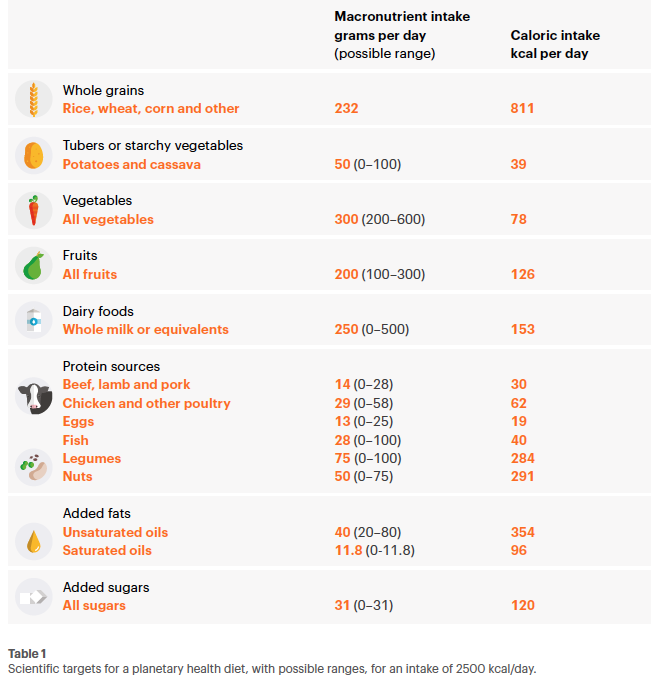The discussion about healthy eating, whilst considering the environment is a topic that comes up much more frequent in my consultations. This can be a real challenge when you want to achieve iron requirements, but not eat too much meat, when you want to achieve essential fatty acid intake, but do not want to contribute towards over-fishing and when you are aware that too much fibre (which is common in a plant-based diet) can impact on the availability of many vitamins and minerals.
Already in 2017, the British Dietetic Association launched a toolkit for dietitians to help them advise a more sustainable diet and recently, the LANCET, one of the most well-known medical journals, gathered healthcare professionals working in public health to work on a diet that is both healthy (i.e. meeting all requirements) and is good for the environment. According to this publication “Global consumption of fruits, vegetables, nuts and legumes will have to double, and consumption of foods such as red meat and sugar will have to be reduced by more than 50%”. A diet rich in plant-based foods and with fewer animal source foods confers both improved health and environmental benefits.” ) I have copied below the suggested diet, based on the research by the LANCET, but the problem with these nutritional aims is that to date, they have not been adjusted for children and in particular for babies and toddlers.

Whilst, I can certainly not replace a whole research team, which really is required to answer this question on exact amount, I will try with this blog to provide some general guidance for parents who want to raise their children taking food sustainability into account but not harming their health.
- Breast milk and/or formula play an essential part of the diet until your baby is 1 year of age and should not be limited due to environmental concerns.
- After 1 year of age full cream milk or plant-based alternative can be considered. According to the planetary diet, cow’s milk/cow’s milk products need to be limited to 250 ml per day, which would not achieve calcium requirements for young children. Whilst calcium enriched plant-based milks provide a similar calcium content, they are generally low in energy, protein (outside of soya-based milk alternatives) and iodine (essential for brain development). Of course, you have other plant-based sources of calcium like broccoli, tahini ect, but the availability for absorption of the body is often quite low due to the fibre content. So it is really difficult to establish exactly how much a baby is in fact absorbing when this nutrient is combined with a lot of fibre. I therefore usually suggest from 1 year of age to aim for 250 ml milk + 1 portion of 30 cheese/100 ml yoghurt to achieve requirements. If you use a plant-based milk, then you need to aim for 300 ml/day or 250 ml + calcium enriched yoghurt (the plant based cheeses are usually enriched with calcium). As a lot of plant-based milks are low in energy and protein (outside of soya) its important to consider how these are replace. In addition, iodine is usually low in plant-based milks and is essential for brain development. It is worth looking at alternatives, including seaweed and in some countries bread is supplemented with iodine (not in the UK).
- If I convert the suggested planetary diet meal plan for protein you get the following weekly plan:
- Red meat – 1x per week
- White meat (poultry) – 2x per week
- Fish – 2x per week, of which one portion should be an oily fish
- Egg – 1 per week
- Legumes (including nuts) – daily
- The above schedule of protein would achieve protein and iron (and zinc) requirements in babies/toddlers, but it is worth to consider combining your legumes with a vitamin C rich source (i.e. fruit as dessert or tomato as finger food) to increase the iron absorption. The reason I am not suggesting here cooked vegetables as vitamin C source, is that a lot of the vitamin C is lost during the cooking process.
- The planetary diet also suggests reducing saturated fats (i.e. animal fats) and increasing polyunsaturated fats. Its very important to mention here, that babies and toddlers (when growing normally) should not be on a low-fat diet, as they need plenty of fat to sustain energy intake and this nutrient contributes also towards brain development. I therefore suggest to use a combination of olive oil, rapeseed oil and sunflower oil (all contribute different fats) and not to avoid nut butters if not allergic. Palm oil is a saturated fat, but it is essential to assess how this has been sourced. In regards to coconut oil, this is also a saturated fat and can be used, but its also important to establish where this has been sourced and think about the fact that both these fats are not manufactured locally in European countries (i.e. needs to be imported).
- The rest of the diet is supposed to be composed of fruit, vegetables and grains. Whole grains I would avoid until 1 year of age and after this age be careful in the amount of wholegrain products, because this can affect the availability of vitamins and minerals by affecting the absorption. For fruit, I would keep to 3 portions of fruit per day (what the child can hold in hand/size of hand) and totally avoid fruit juice.
- Avoid sugar, honey and salt definitely until 1 year of age and limit this to a minimum after 1 year of age.
I will post guidance on vegan/vegetarian diets in my next blog, as I know this is also a hot topic.
Lastly, it is important to note that this advice is not suitable for children that are on a restricted diet due to allergies or other conditions and they require individualised advice. If in doubt, speak to your dietitian.
